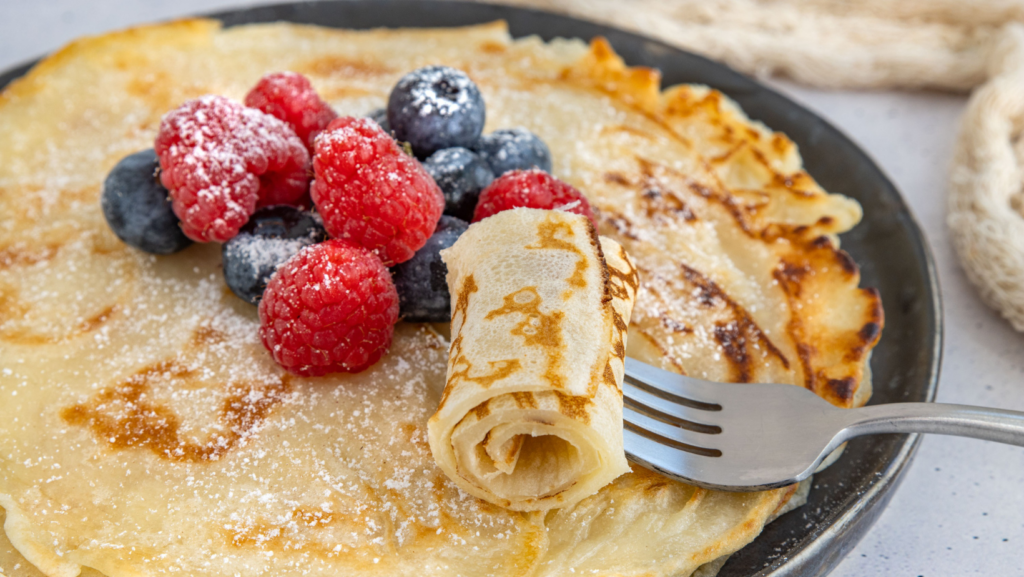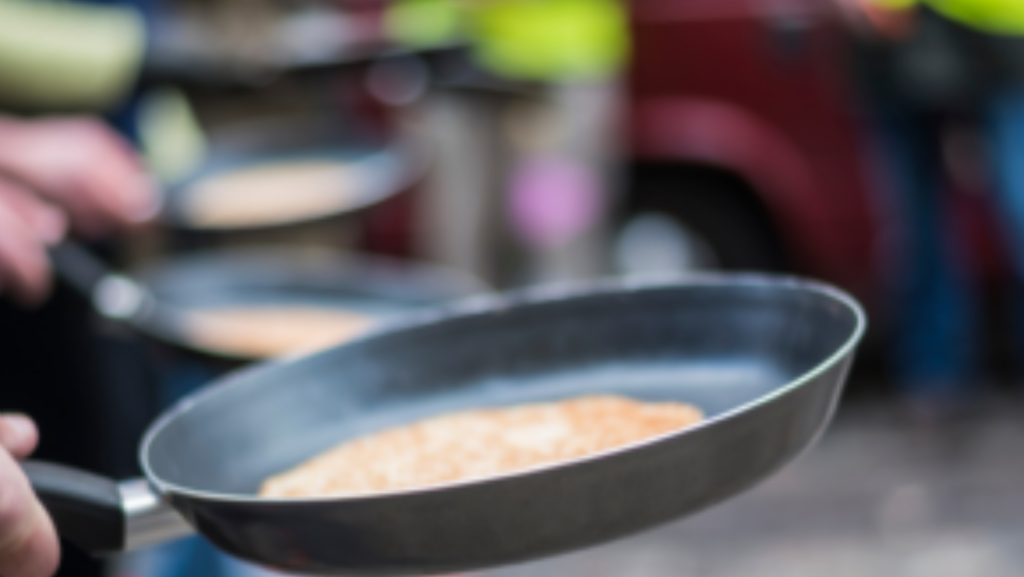Shrove Tuesday, (that’s Pancake Day to you and me!) is a Christian half festival observed just before Lent. Typically in modern English culture, it involves the consumption of pancakes, mob football and unfortunately here on one occasion in Norwich, brutal violence! Thankfully most aspects of Shrove Tuesday have a more jovial affair to them so read on if you want to know more about the strange history of this festival, and what we did here in Norwich!

Christianity and Fasting: What is Shrove?
Many religions observe fasting (the act of refraining from eating or drinking for a set period of time) as part of a holy ritual, usually linked to get closer to divinity or enlightenment. In Christianity, it is used on several holy holidays such as Black Fast, Good Friday, and Spy Wednesday. The most observed today however is that of Lent! The period of Lent is over 40 days and during this time, Christians practice fasting. This can be done in a number of ways! Some Christians don’t eat until after sun down, others refrain from eating richer foods such as meat, dairy or alcohol. Some follow the Daniel Fast which is a purely vegetarian diet during that time! It is meant to be a reflection on a story from the Bible in which Jesus wandered the desert for 40 days and 40 nights, without food or water, while resisting temptation from Satan. The question is, however, how do you resist temptation when your house is full of tasty foods? Well that is where Shrove Tuesday comes in! Traditionally you used up all the sugar, flour and dairy products in your storage and what better way to use them than to make them into pancakes!
The word “shrove” comes from the older English word “shrive” which means to absolve one’s ‘sins’ through confession. Traditionally on this day, and throughout ‘Shrovetide’, leading up to Shrove Tuesday, bells would ring from the many churches to call people to confess their sins, reflect on self improvement and to recommit themselves to God. That way, they could use the fasting period of lent to lead a more somber time of reflection that ended with Easter. For some Christians, it is important to make a “Lenten Sacrifice” during this time which is to give up an indulgence, again, in an effort to be closer to God.
Customs during Shrove Tuesday
Blood Sports
Shrove Tuesday has had several customs associated with it over the centuries. As it is meant to be “the final feast” before the more sombre lent, people saw it as an opportunity to have fun as well before they would focus more on prayer. As a result games were commonplace although sadly, for many centuries there was a tradition of enjoying blood sports on this day. These consisted of cock fighting and badger and bull baiting. Cock fighting is when two cockerels are placed in a small pit or arena and bets are placed before they’re made to fight to the death or until one is critically injured. Cockerels, unlike the female hens, instinctively fight each other on sight. In the wild this is for the right to mate but when in an arena, there is no escape if one was to lose the fight and therefore death of at least one of the animals were commonplace. Some owners even placed metal tips on the ends of the spurs that they use to fight making them more deadly.

Badger baiting is a cruel sport in which a captured badger is placed in a small box with a tube leading down to it. A small dog, such as a terrier, is then placed down the tube. Badgers are incredibly territorial and will attack anything that comes into their set so would immediately attack the dogs. The dogs were trained to grab on to the badgers and not let go and the owner of the dog would then try to pull both the dog and badger out of the tube by holding the back legs of the dog. If both the dog and badger survived, the badger was successfully removed from the set, the game was reset and continued. Bets were taken on the number of times the badger could be removed this way before either the badger or the dog died. Bull baiting was similar but the badger was replaced by a bull and the event would take place in an arena with multiple dogs who would try to bring the bull down by the snout or throat. Some people even believed that this improved the beef. Thankfully all three of these barbaric practices were banned in 1835 thanks to the passing of the Cruelty to Animal Act in parliament.
Pancake Racing
Thankfully not all traditions around this time were as cruel as those mentioned above! A very popular sport on Shrove Tuesday, and one still observed in schools and communities around the country today, is that of pancake racing! According to folklore, in Olney in Buckinghamshire in 1445, a woman was cooking pancakes in a skillet on her stove when she heard the Shriving Bell calling everyone to church for confession. Realising she was going to be late, she grabbed the pan, complete with pancake and ran out the door. She rushed all the way to church as quickly as she could, flipping the pancake in the pan as she went to stop it from burning on one side. This whimsical story inspired the sport that is still enjoyed on pancake day today!

The idea of a pancake race is for contestants to run from one goal to another while holding a pan with a pancake in it. While running, the contestant must be flipping the pancake and catching it in the pan. If the pancake is dropped, the contestant is out and the winner is the first to cross the finish line with their pancake still in the pan, having flipped it the entire time! The length of the race can vary from a few metres, to across a town or village and the number of flips that must be completed also varies. Some races take place in fancy dress which can add further complications to the contestants!
Pancake races are typically performed by schools or in small market towns, but in 2023 here in Norwich, the cathedral staff, choir, clergy and families took part in a pancake race around the cloisters!
Mob Football
Since the 12th century, another tradition of playing mob football on Shrove Tuesday has been observed across Britain. It is thought that this is how the sport might have been played originally before the current rules were put in place in the 19th century. Mob football consists of two sides but with a non specified number of players. Sometimes the entire populations of towns would get involved so there could be dozens to hundreds of players in a single game at the same time. Two goals are placed far apart, sometimes up to three miles from each other, and the two sides have to use their feet and hands to get the ball to the opponents goal across all of the obstacles found in the streets.

Mob football was first recorded in 1174 in William Fitzstephen’s Descriptio Nobilissimi Civitatis Londoniae: He describes the game as follows: “all the youth of the city go out into the fields to take part in a ball game… Older citizens, fathers, and wealthy citizens come on horseback to watch their juniors competing, and to relive their own youth vicariously. You can see their inner passions aroused as they watch the action and get caught up in the fun being had by the carefree adolescents.” So it appears that it had been being played for sometime until this point!
Balls were traditionally solid. Some were leather stuffed with straw, moss, feathers or sawdust and some were even small, solid wooden balls. This lends more to the use of hands during the game so it’s possible that the name “Foot-ball” comes from the idea that it’s played while on foot rather than exclusively playing with your feet. To raise money for the Shrove Tuesday ball game, there were often sponsors among town officials or wealthy merchants in the area. In some parts of the country, and in Scotland and Ireland, newly-wed couples had to pay a “football due” as a form of tax which would be used to fund the game played during the festival.
The main mention of the sport throughout history has mostly been through its banning! Not only did it cause injuries among the players, who often trampled or tripped one another or physically fought over the ball, but it also caused destruction to the environment around them. Shop fronts usually had to be boarded up before a game took place and often grassy heaths were churned up in the process of the game as well. Religious groups saw it as a barbaric practice, especially under the puritans (surprise, surprise). Even the royal family would often call for its banning, describing those that took part in the games as “vain, unthrifty and idle.” There were 30 attempts to ban the sport from the 1300s to the 1600s and by the 1700s it was banned in most major cities across the country. In the 1800s, the rules and regulations associated with football today were put in place. Despite this, Mob Football is still observed today in various market towns across Britain, most famously in Ashbourne in Derbyshire.
Fancy a pancake now?
If all you have thought about since the beginning of this blog is pancakes, well, why not make your own! Please see below a basic pancake recipe so you can make your own to enjoy during this historic festival!
Ingredients:
- 100g Plain Flour
- 2 Large Eggs
- 300ml Milk
- 1 tbsp sunflower oil
- Whatever you want to top it off with! I like to just put lemon juice and sugar on mine!
Method:
- Place all ingredients other than your topping into a large jug and whisk until smooth. Around the consistency of single cream.
- If you can, set the mixture aside for 30 minutes to breathe. This is not compulsory!
- Set a medium frying pan on a medium heat and wipe with an oil soaked piece of kitchen paper to grease
- When hot, place a dollop of mixture into the pan and move the pan around to so the mixture spreads to the edges, add more mixture quickly if too little was put it.
- Cook for 1 minute or until small bubbles appear and turn over to cook on the other side for one minute. Remember, the first pancake always comes out a bit wonky!
- Place your topping onto the pancakes and enjoy while hot!